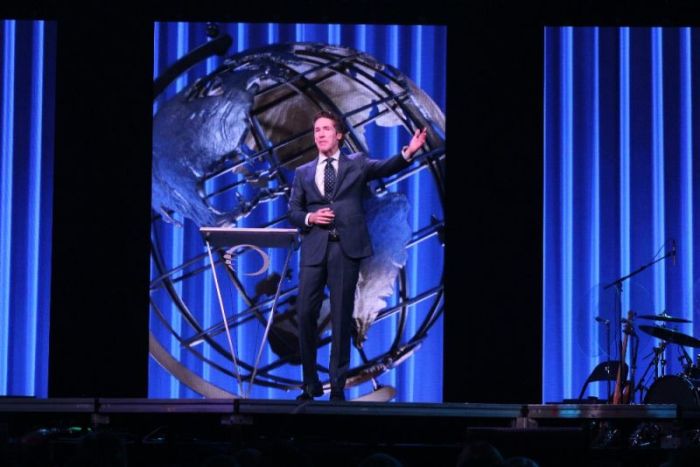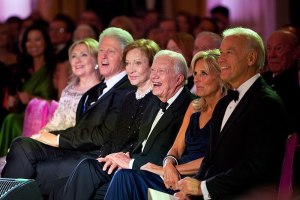Joel Osteen on Following the 'Billy Graham Rule,' Discusses Pastors' Accountability and Depression

WASHINGTON — In an age in which pastors are frequently being brought down by sexual scandals, popular author and Pastor Joel Osteen says he follows what is known as the "Billy Graham rule."
The 55-year-old Osteen, whose sermons are seen on television by millions worldwide each week, spoke with The Christian Post before taking the stage for his monthly "Night of Hope" event attended by thousands at Capital One Arena last Saturday.
The Houston, Texas-based pastor talked about his new book, Next Level Thinking: 10 Powerful Thoughts for a Successful and Abundant Life, and answered a number of questions touching on subjects that range from pastor accountability and depression to whether his 45,000-member Lakewood Church has considered becoming a multicampus congregation.
Below is an edited transcript of CP's interview with Osteen:
CP: There's a lot in the news today. It seems like every now and again, we are seeing pastors or clergy being brought down by some [sexual] scandal or another. For you, what steps for accountability do you have? Do you follow the Billy Graham rule [where men avoid spending time alone with women they are not married to]?
Osteen: I do and I always have, and my father did too. I think the key for me on that is to start every day — I take the first half hour of every day to search my own heart to ask God, 'Am I on track and doing this for the right reasons? Am I following what you want me to do?' To me, you can have a lot of accountability and that is important. But I think you can hide things too.
I think it's important to be honest before God every day and check the reasons why you are doing what you are doing. To me, when I stand before God having a pure heart, I can go out and be my best.
CP: As a pastor, especially one who is in the limelight like you are, do you find that you ever struggle with loneliness? A lot of pastors today are suffering from depression or anxiety. For you, is that something that you suffer from? What advice do you have for other pastors as we see a many pastor suicides in the news.
Osteen: It is a sad thing and I think it comes to us all. I am blessed to have a health family around me and friends, so I don't suffer from that. I know it can be very lonely because as a pastor, you are busy and there is always something to do.
I would just encourage other pastors to take care of themselves, not just physically or spiritually, but emotionally, and find some other friends and take time to connect. That's really one reason why we started our Champions Network. It's a group of pastors who service people. How do we connect? How do we get to know each other?
When we are done with this [interview], I will go meet a couple dozen pastors who are here today and it's really just to be in relationship and to say, "Hey, we are all in this together." I think it's important to have those healthy pastoral relationships.
CP: How often do you consult with trusted advisers?
Osteen: All the time, throughout the week. I have a certain group that I probably talk to every month or so. I am in contact with a lot of them all the time, through text and just encouraging one another and trying to do our best and watch after each other.
CP: New Testament scholar Scot McKnight contends that Pastor Bill Hybels had too much autonomy at Willow Creek Community Church [in South Barrington, Illinois]. For Lakewood, also a nondenominational evangelical megachurch, who oversees the pastors at Lakewood? Is there a board of elders? How does that work for your guys?
Osteen: There is a board of directors and then I have an advisory board as well. Just always meeting together. Again, I think staying in a relationship and being whole with God.
CP: Have you guys considered going multicampus? Why or why not?
Osteen: We did early on. As a matter of fact, someone offered me a lot of theaters that I could use all over the nation, but I just felt like what we do with TV and media is what I feel like I am called to do.
Really, being a local pastor, I would rather feed people into great local churches in different areas. For instance, when we come into D.C., we are working with these couple dozen churches and I want to feed them into their churches. Really, I have thought about it and I have friends that do the multisite. But Lakewood, for me, we will probably stick with the single location for now.
CP: One of the criticisms of you is that you're more of a motivational speaker than a pastor? You recently did an interview where you said that you were more of an "encourager" than a traditional pastor. How do you respond to the claim that you're more of a motivational or inspirational speaker than a pastor?
Osteen: That doesn't bother me because I want to motivate people to know God. Half the people that are coming here tonight weren't raised in church or don't go to church, or this is all new to them. They won't sing during the worship, they will just watch. But I think my personality is encouraging and it's maybe motivational. But I want to motivate you to break addictions, to live for God. We all have different gifts.
I have friends that are great teachers, I have other ones that speak on prophecy. To me, you got to be who God made you to be. I have been this way before I was a pastor. I was always upbeat and encouraging. That is where your anointing is — is what God made you to be. It seems like these days, everybody is trying to make somebody like this or somebody like that. I think that it takes maturity and takes discipline to say, "I am going to stay in my lane and be who God called me to be."
CP: A lot of people when they refer to you they refer to the words "prosperity gospel." Would you say it's fair to consider you a prosperity gospel pastors?
Osteen: I don't think so. I don't fully know what [prosperity gospel] means. I think there is only one Gospel and that is the Gospel that Jesus died and rose again. When I think of prosperity, I think of someone asking for money. I don't do that.
Prosperity is having good health and being able to sleep at night and having good relationships. It's having money to pay our bills and follow your dreams. It is not about wealth and getting rich. That is kind of what I see when I hear "prosperity." I talk about all types of things. On purpose, I stay away from money [in my sermons] because people already think TV pastors are frauds and all that. I try to stay away from that, but I do believe God wants you to be blessed.
We couldn't have [acquired] the Compaq Center if we didn't have people that God blessed them. I think He wants us to rise higher. This event cost hundreds of thousands of dollars tonight. That's because people are able to give and be blessed.
CP: You have a new book out. Tell us about that and how it might differ from your other books.
Osteen: It's called Next Level Thinking: 10 Powerful Thoughts for a Successful and Abundant Life.
It's our core message but I believe a lot of people get stuck. It starts in our thinking. Even when I took over for my father [in 1999], I thought I can't [be a minister]. I haven't been through seminary. I don't have the training, the experience.
I knew God put it in my heart but the battle takes place in our thoughts and our mind. So the book is about taking the limits off of yourself and to know that when God breathed life into you, He gave you everything you need to fulfill your destiny and really live from a fully-loaded perspective, not from a lacking perspective. I thought, I don't have the talent or the dynamic personality like my father, but really I had what I needed. That is what I encouraged the readers to do.
CP: What are you going to tell the crowd tonight?
Osteen: I am going to tell them that God has them in the palm of His hand that their best days are not behind and that they're still in front. I am going to try to let them know that God has a purpose for them. We have a lot of inspirational segments. My mom will talk about how she overcame cancer. Victoria will talk about how you have been chosen by God. My son has a new segment that he does on legacy and he talks about his grandfather, my dad. That is very powerful too.
It is geared for people who weren't raised in church. The longest segment is about eight minutes to 10 minutes except when I speak at the end. It's a lot of inspirational stories and usually 80 percent of the people will take a stand for Christ — either first time or rededicate themselves. That is why we continue to do it. Some people won't go to a church but they will come to a basketball arena or baseball stadium. That is the whole goal of these things and to get them plugged into a Bible-based church.





























